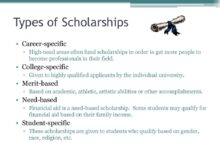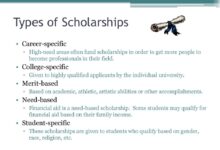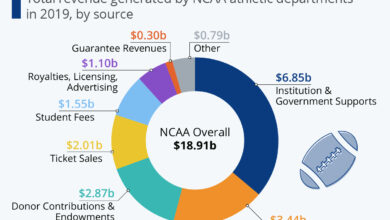Best Need-Based Scholarships To Support Your Education – Scholarships Simplified
Best Need-Based Scholarships to Support Your Education sets the stage for this informative journey, offering readers valuable insights into the world of need-based scholarships with a focus on clarity and conciseness.
Explore the various facets of need-based scholarships and how they can positively impact your educational pursuits.
Types of Need-Based Scholarships
When it comes to need-based scholarships, there are various types available to support students in their educational pursuits. These scholarships are designed to provide financial assistance to those who demonstrate a genuine need for help in funding their studies.
Application Process for Need-Based Scholarships
The application process for need-based scholarships typically involves submitting detailed financial information to demonstrate the need for financial aid. This may include providing tax returns, income statements, and other relevant documents to support the application.
Eligibility Criteria for Need-Based Scholarships
To be eligible for need-based scholarships, students must meet certain criteria set by the scholarship provider. This often includes maintaining a certain GPA, demonstrating financial need, and being enrolled in an accredited educational institution. Each scholarship may have specific requirements, so it is important to carefully review the eligibility criteria before applying.
Tips for Writing a Compelling Essay for Need-Based Scholarship Applications
Writing a compelling essay for need-based scholarship applications is crucial to stand out from other candidates. Here are some tips to help you craft a strong essay:
- Be honest and authentic in sharing your story and demonstrating your financial need.
- Highlight any challenges or obstacles you have overcome to pursue your education.
- Connect your personal experiences to your academic and career goals to show your dedication and motivation.
- Proofread your essay carefully to ensure it is free of errors and presents your ideas clearly.
- Show gratitude for the opportunity and explain how the scholarship will help you achieve your educational aspirations.
Eligibility Criteria
When applying for need-based scholarships, it is important to understand the eligibility criteria that determine who qualifies for financial assistance. The common requirements for need-based scholarships typically revolve around factors such as household income, assets, and the number of dependents in the family.
Financial Need Determination
Financial need is usually assessed through the completion of financial aid forms like the Free Application for Federal Student Aid (FAFSA) or other relevant financial documentation. These forms help scholarship committees evaluate the applicant’s financial situation and determine the level of need for assistance.
- Household Income: Scholarship programs often consider the total income of the applicant’s household to assess financial need. Lower household incomes may increase the chances of qualifying for need-based scholarships.
- Assets: In addition to income, the value of assets owned by the applicant and their family may also be taken into account. This includes savings, investments, and property.
- Number of Dependents: The number of dependents in the applicant’s family can impact the level of financial need. More dependents may indicate a greater need for assistance.
Tips for Meeting Eligibility Criteria
To improve your chances of meeting the eligibility criteria for need-based scholarships, it is crucial to submit all required financial information accurately and on time. Here are some tips to help you navigate the application process successfully:
- Complete all Financial Forms: Ensure that you fill out all required financial forms, such as the FAFSA, accurately and provide all necessary documentation to support your application.
- Meet Deadlines: Be mindful of application deadlines and submit your financial information on time to avoid missing out on scholarship opportunities.
- Provide Detailed Information: Give a comprehensive overview of your financial situation, including any special circumstances that may impact your ability to pay for education.
- Seek Guidance: If you have questions or need assistance with the application process, don’t hesitate to reach out to financial aid advisors or scholarship providers for help.
Application Process
When it comes to applying for need-based scholarships, there are several steps you need to follow to increase your chances of success. From gathering required documents to submitting your application, each step plays a crucial role in securing financial aid for your education.
Gather Necessary Documents
- Start by collecting all the required documents, such as tax returns, proof of income, letters of recommendation, and transcripts.
- Make sure to double-check the application guidelines to ensure you have all the necessary paperwork.
Fill Out Applications Carefully
- Take your time filling out the applications to avoid making mistakes that could lead to disqualification.
- Provide accurate and detailed information to present a clear picture of your financial need.
Write a Compelling Essay
- Many need-based scholarships require applicants to write an essay explaining their financial situation and why they need the scholarship.
- Craft a compelling essay that highlights your achievements, challenges, and aspirations to stand out from other applicants.
Submit Your Application Early
- Don’t wait until the last minute to submit your application. Submitting early can give you an edge and show your commitment to the scholarship.
- Ensure all components of your application are complete and submitted before the deadline to avoid missing out on opportunities.
Preparing a Strong Application
To prepare a strong application for need-based scholarships, it’s essential to showcase your financial need clearly and effectively. Here are some tips to help you stand out:
– Be honest and transparent about your financial situation.
– Highlight any extenuating circumstances that have impacted your need for financial assistance.
– Tailor your application to each scholarship opportunity, emphasizing the specific criteria outlined by the scholarship provider.
– Seek feedback from mentors, teachers, or counselors to strengthen your application.
– Proofread your application carefully to avoid spelling and grammatical errors that could detract from your overall presentation.
Common Mistakes to Avoid
Avoiding common mistakes during the application process can significantly improve your chances of securing need-based scholarships. Here are some pitfalls to steer clear of:
– Missing deadlines or submitting incomplete applications.
– Providing inaccurate or misleading information about your financial need.
– Failing to follow instructions or meet the specific requirements outlined by the scholarship provider.
– Neglecting to proofread your application for errors before submission.
– Overlooking the importance of crafting a compelling essay that effectively communicates your story and financial need.
Supporting Documents
When applying for need-based scholarships, there are essential documents that are usually required to support your application. These documents are crucial in providing evidence of your financial need and academic achievements.
Importance of Recommendation Letters
- Recommendation letters from teachers, counselors, or employers can strengthen your scholarship application by providing insight into your character, work ethic, and academic abilities.
- These letters offer a perspective on your abilities that may not be evident from your academic records or personal statement.
- Strong recommendation letters can give scholarship committees a better understanding of who you are as a student and individual, increasing your chances of receiving the scholarship.
Tips on Gathering and Organizing Supporting Documents
- Start by creating a checklist of all the required documents for each scholarship application to ensure you don’t miss anything.
- Make copies of all your documents and keep them organized in a folder or digital file for easy access.
- Request recommendation letters well in advance from individuals who know you well and can speak to your abilities and character.
- Provide your recommenders with all the necessary information, such as deadlines and specific requirements, to help them write a strong letter on your behalf.
- Follow up with your recommenders to ensure they submit their letters on time and thank them for their support.
Impact of Need-Based Scholarships
Need-based scholarships play a crucial role in supporting students’ educational aspirations by providing financial assistance to those who require it most. These scholarships help students access higher education opportunities that may have otherwise been out of reach due to financial constraints.
Significance of Need-Based Scholarships
Need-based scholarships not only alleviate the financial burden on students but also empower them to pursue their academic goals without worrying about the cost of education. By removing financial barriers, these scholarships enable deserving students to focus on their studies and achieve their full potential.
Stories of Beneficiaries
- One student, Sarah, shared how receiving a need-based scholarship allowed her to attend college and pursue her dream of becoming a nurse. Without the financial support, Sarah would have had to work multiple jobs to afford tuition, making it impossible to focus on her studies.
- Another beneficiary, John, highlighted how a need-based scholarship transformed his life by providing him with the opportunity to attend a prestigious university. This enabled John to secure a well-paying job after graduation, breaking the cycle of poverty in his family.
Long-Term Impact
Receiving a need-based scholarship can have a lasting impact on a student’s academic journey. Studies have shown that students who receive financial aid are more likely to complete their degree on time and have higher graduation rates compared to those who do not receive such support.
Statistical Data
According to recent data, college enrollment rates have significantly increased due to the availability of need-based scholarships, particularly among low-income and underrepresented students.
Academic Performance
There is a strong correlation between need-based scholarships and academic performance among recipients. Students who receive financial aid are able to focus on their studies without the added stress of financial worries, leading to improved grades and overall academic success.
Retention Rates
Research indicates that students who receive need-based scholarships have higher retention rates compared to those who do not, as they are more likely to stay enrolled and complete their degree program.
Case Study
Let’s consider the case of Emily, who received a need-based scholarship to pursue a degree in computer science. With financial assistance, Emily was able to graduate with honors and secure a lucrative job at a tech company, opening up endless career opportunities that were once out of reach.
Trends in Need-Based Scholarships
As the landscape of education and financial aid continues to evolve, several trends have emerged in the field of need-based scholarships. These trends are influenced by various factors, including economic changes, governmental policies, and societal demands.
Increased Emphasis on Equity and Inclusion
One notable trend in need-based scholarships is the increased emphasis on equity and inclusion. Institutions and organizations are recognizing the importance of providing financial support to students from diverse backgrounds, ensuring that all individuals have equal access to education.
Shift to Digital Applications and Processes
In response to the pandemic, there has been a noticeable shift towards digital applications and processes for need-based scholarships. This change has made it easier for students to apply for financial aid remotely, streamlining the application process and increasing accessibility.
Growing Importance of Emergency Aid
The pandemic has highlighted the importance of emergency aid in supporting students facing unexpected financial challenges. As a result, there is a growing trend towards providing need-based scholarships that offer immediate assistance to students in crisis situations.
Collaboration Between Institutions and Organizations
Another trend in need-based scholarships is the increased collaboration between educational institutions and external organizations. By working together, these entities can pool resources and expertise to maximize the impact of financial aid programs and reach a larger number of students in need.
Notable Need-Based Scholarships
When it comes to prestigious need-based scholarships, there are several options available for students looking to support their education. These scholarships not only provide financial assistance but also offer recognition and opportunities for academic and personal growth.
Gates Millennium Scholars Program
The Gates Millennium Scholars Program is known for its generous support for minority students with financial need. The application deadline for this scholarship typically falls in January each year. To be eligible, applicants must demonstrate leadership abilities, academic excellence, and community involvement. Recipients of this scholarship receive funding for their entire undergraduate and graduate education, along with leadership development opportunities.
Jack Kent Cooke Foundation Scholarship
The Jack Kent Cooke Foundation Scholarship is another prestigious award that supports high-achieving students with financial need. The application deadline varies, but it is usually around November each year. Eligible candidates must demonstrate academic excellence, leadership potential, and financial need. Recipients of this scholarship receive funding for tuition, living expenses, and other educational costs, along with personalized advising and networking opportunities.
Coca-Cola Scholars Program Scholarship
The Coca-Cola Scholars Program Scholarship is a well-known award that supports students with financial need and a commitment to community service. The application deadline for this scholarship is typically in October each year. To be eligible, applicants must demonstrate leadership abilities, academic achievement, and community involvement. Recipients of this scholarship receive funding for their undergraduate education, along with access to a supportive network of alumni and mentors.
Horatio Alger Scholarship
The Horatio Alger Scholarship is a prestigious award that supports students who have overcome adversity and demonstrated resilience. The application deadline for this scholarship is usually in October each year. Eligible candidates must have financial need, academic achievement, and a commitment to pursuing higher education. Recipients of this scholarship receive funding for their undergraduate education, along with mentorship and support services.
Impact of Notable Need-Based Scholarships
These prestigious need-based scholarships have a significant impact on recipients by providing financial support, recognition, and opportunities for personal and academic growth. They help students pursue their educational goals without the burden of excessive debt, while also fostering a sense of community and support among scholars. The reputation of these scholarships opens doors to future opportunities and helps recipients achieve their full potential.
Overcoming Financial Barriers
When it comes to accessing need-based scholarships, overcoming financial barriers is crucial for students seeking financial assistance for their education. Here, we will offer specific strategies, tips, success stories, and a comparison table to guide students in securing need-based scholarships.
Strategies for Writing Compelling Personal Statements or Essays
- Highlight personal experiences and challenges that showcase financial need.
- Emphasize academic achievements and extracurricular activities to demonstrate potential.
- Showcase specific goals and ambitions to convey determination and drive.
- Seek feedback from mentors or advisors to refine and polish your personal statement.
Step-by-Step Process of Filling Out Scholarship Applications
- Read and understand all instructions carefully before starting the application.
- Gather all necessary documents such as transcripts, recommendation letters, and financial information.
- Pay attention to deadlines and plan ahead to avoid last-minute stress.
- Review and revise your application multiple times to ensure accuracy and completeness.
Success Stories of Students Securing Need-Based Scholarships
One student, Sarah, actively sought guidance from her school’s financial aid office and utilized online resources to find suitable scholarships. By carefully crafting her personal statement and submitting a well-prepared application, she secured a full-ride scholarship to her dream university.
Comparison Table of Need-Based Scholarship Opportunities
| Scholarship | Eligibility Criteria | Application Deadlines | Potential Award Amounts |
|---|---|---|---|
| Scholarship A | Minimum GPA of 3.0, demonstrated financial need | April 30 | $5,000 – $10,000 |
| Scholarship B | First-generation college student, community involvement | March 15 | $2,500 – $7,500 |
| Scholarship C | Underrepresented minority, pursuing STEM field | May 15 | $3,000 – $8,000 |
Diversity and Inclusion in Need-Based Scholarships
Promoting diversity and inclusion in need-based scholarship programs is crucial for creating equal opportunities for all students, regardless of their backgrounds or circumstances. By ensuring that underrepresented groups have access to these scholarships, we can address systemic inequalities and empower individuals to pursue higher education.
Initiatives to Increase Access
- Targeted outreach programs aimed at underrepresented communities to raise awareness about available need-based scholarships.
- Partnerships with organizations that focus on supporting marginalized groups to facilitate the application process for scholarships.
- Establishing specific quotas or reserved spots for students from underrepresented backgrounds to ensure fair representation in scholarship selection.
Impact of Diverse Perspectives
Having diverse perspectives in the selection process for need-based scholarships can lead to more inclusive decisions and a broader range of experiences being considered. This can help break down stereotypes and biases that may exist in the evaluation process.
Employer-Based Scholarships
Employer-based scholarships are unique opportunities provided by companies to support their employees or their dependents in pursuing higher education. These scholarships are designed to help alleviate the financial burden of education and enhance the skills and knowledge of their workforce.
Organizations Offering Employer-Based Scholarships
- Starbucks College Achievement Plan
- Walmart Associate Scholarship Program
- Chipotle Education Assistance Program
Benefits of Employer-Based Scholarships
- Direct support from the employer
- Increased employee loyalty and retention
- Alignment of education with company goals
Comparison of Eligibility Criteria
| Employer-Based Scholarships | Government-Funded Scholarships |
|---|---|
| Open to employees or dependents | Open to general public |
| May require certain tenure or performance criteria | Based on academic merit or financial need |
Application Process for Employer-Based Scholarships
To apply for an employer-based scholarship, employees typically need to follow these steps:
- Check eligibility criteria and deadlines
- Complete the application form
- Submit required documents such as proof of employment, transcripts, and recommendation letters
- Meet application deadlines
Approaching Employers for Scholarship Opportunities
Employees can approach their employers by scheduling a meeting with the HR department or directly with their managers. It’s important to express interest in continuing education and inquire about any available scholarship programs. Employees should be prepared to discuss how the scholarship aligns with their career goals and the benefits it can bring to the company.
Balancing Academic and Scholarship Commitments
Finding a balance between academic responsibilities and applying for need-based scholarships can be challenging for students. Effective time management and prioritization are crucial in successfully managing both aspects. Let’s explore some tips and strategies to help students excel academically while pursuing scholarship opportunities.
Creating a Study Schedule to Accommodate Scholarship Deadlines
Creating a study schedule that aligns with scholarship application deadlines is essential to avoid last-minute stress and ensure that both academic and scholarship commitments are met. Here’s a step-by-step guide to help you stay organized:
- Start by listing all your academic assignments, tests, and deadlines.
- Identify key scholarship application deadlines and requirements.
- Allocate specific time slots each week dedicated to working on scholarship applications.
- Break down larger tasks into smaller, manageable steps to make progress consistently.
- Regularly review and adjust your study schedule based on academic workload and scholarship deadlines.
Setting Specific Goals for Academics and Scholarship Applications
Setting clear and specific goals for both academics and scholarship applications can help you stay focused and motivated. Consider the following tips:
- Define academic goals related to GPA, class rankings, or specific achievements.
- Set SMART goals (Specific, Measurable, Achievable, Relevant, Time-bound) for scholarship applications.
- Track your progress towards these goals regularly and make adjustments as needed.
Leveraging Academic Achievements in Scholarship Essays
When writing scholarship essays, it’s essential to showcase your academic achievements and extracurricular activities effectively. Here are some strategies to consider:
- Highlight specific examples of how your academic achievements demonstrate your dedication and potential.
- Connect your extracurricular activities to the values and goals of the scholarship provider.
- Showcase leadership skills, teamwork, and other qualities developed through your academic pursuits.
Seeking Support from School Counselors or Mentors
Navigating the demands of academics and scholarship applications can be overwhelming, but seeking support from school counselors or mentors can make a significant difference. Consider the following recommendations:
- Discuss your academic and scholarship goals with a school counselor to receive guidance and advice.
- Seek feedback on scholarship essays and applications to improve their quality and competitiveness.
- Establish a support network of mentors who can provide valuable insights and encouragement throughout the process.
Mentorship and Networking Opportunities
Need-based scholarships not only provide financial support but also open doors to mentorship and networking opportunities for students. These connections can play a crucial role in guiding scholarship recipients towards academic and professional success.
Role of Mentors in Guiding Scholarship Recipients
Mentors serve as valuable guides for scholarship recipients, offering advice, support, and insights to help students navigate their academic and career paths effectively. They can provide valuable industry knowledge, career advice, and networking opportunities.
Leveraging Scholarship Connections for Career Development
- Attend networking events organized by scholarship providers or educational institutions to connect with potential mentors in your field.
- Utilize online platforms like LinkedIn to reach out to professionals in your industry and seek mentorship opportunities.
- Join professional organizations related to your field to expand your network and meet potential mentors.
Initiating and Maintaining Mentor Relationships
- Express genuine interest in learning from your mentor and be proactive in seeking guidance and feedback.
- Schedule regular meetings or check-ins to update your mentor on your progress and seek advice on your academic and career goals.
- Show gratitude for your mentor’s time and expertise, and be open to feedback and constructive criticism.
Showcasing Skills and Accomplishments to Mentors
- Share your academic achievements, projects, and goals with your mentor to demonstrate your dedication and passion for your field.
- Seek opportunities to work on projects or assignments that showcase your skills and talents to your mentor.
- Seek feedback from your mentor on how you can further develop your skills and improve your chances of success in your academic and professional endeavors.
Community Impact of Need-Based Scholarships
Need-based scholarships play a crucial role in not only supporting individual students but also in building stronger communities. By providing financial assistance to those in need, these scholarships have a ripple effect that extends far beyond the recipients themselves.
Empowering Community Initiatives
Need-based scholarship recipients often use their education to give back to their communities in various ways. For example, some may start community projects focused on education, healthcare, or environmental sustainability. These initiatives help address local challenges and improve the overall well-being of the community.
Economic Growth and Social Mobility
- Need-based scholarships contribute to economic growth by enabling individuals to pursue higher education and secure better employment opportunities. As scholarship recipients advance in their careers, they can contribute more effectively to the local economy.
- Moreover, by providing access to education, need-based scholarships promote social mobility and reduce income inequality within communities. This leads to a more equitable society where individuals have the opportunity to succeed regardless of their financial background.
Fostering a Culture of Giving Back
Individuals who benefit from need-based scholarships often develop a strong sense of gratitude and a desire to give back to their communities. This culture of giving back can inspire others to support education initiatives and contribute to a more compassionate and supportive community environment.
Last Recap
In conclusion, Best Need-Based Scholarships to Support Your Education shed light on the importance of financial aid in achieving academic goals, emphasizing the transformative power of scholarships in shaping future success.









